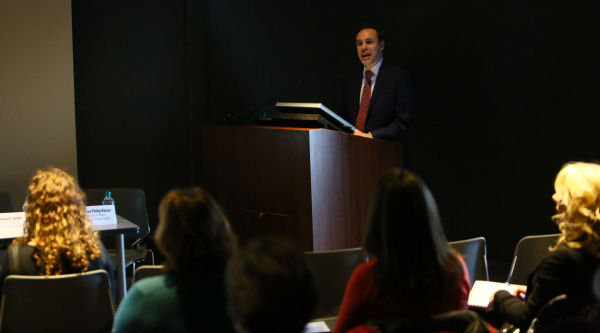State Health Department Urges New Yorkers to "Get Smart" About Antibiotics
New Statewide Antimicrobial Resistance Task Force Unveiled at Antibiotic Resistance Roundtable Forum addressing importance of appropriate antibiotic prescribing and use.
ALBANY, N.Y. (November 18, 2015) - New York State Health Commissioner, Dr. Howard Zucker today urged New Yorkers to have a talk with their health care providers before asking for antibiotics because they may not be appropriate and may even pose additional health risks.
The message was delivered as part of "Get Smart Week" (November 16-22, 2015), a coordinated effort by the federal Centers for Disease Control and Prevention (CDC), state and local health departments, and community partners. According to the CDC, at least 2 million people become infected with bacteria that are resistant to antibiotics every year in the U.S. and at least 23,000 people die as a result of these infections.

Commissioner Zucker opens the 'Get Smart About Antibiotics' Roundtable Forum.
"Antibiotics work wonders when it comes to fighting bacterial infections, but most upper respiratory infections are viral, and cannot be treated with these medications," Dr. Zucker said. "When an illness is viral, prescribing an antibiotic might actually do more harm than good. Patients and providers alike need to think carefully before automatically asking for or prescribing an antibiotic."
The "Get Smart about Antibiotics Roundtable Forum" brought together experts from the state Department of Health (DOH), University at Albany School of Public Health, DOH Wadsworth Center, private physician practice and pharmacy sectors, to talk about the pressing need for solutions to increasing antibiotic resistance.
"The emergence of antibiotic resistant organisms is of great concern to the medical profession and to public health experts. There is a critical need to educate the public and physicians about the nature and magnitude of this problem and what measures they can take to minimize the harmful effects of antibiotic over use and misuse both in humans and animals." Said Philip Nasca, Dean, UAlbany School of Public Health. "The CDC 'Get Smart' program provides extremely useful guidelines that can be followed by the public and health professionals to help ameliorate this problem."
At the forum, Dr. Zucker announced the creation of the DOH Antimicrobial Resistance (AR) Task Force which includes members within DOH who coordinate and collaborate across programs to develop new initiatives to combat antimicrobial resistance. The task force will also invite external partners such as academic experts, other state and local agencies, provider organizations, agriculture partners, and more, to be involved in this essential work. The task force will ultimately shape New York's response and strategic approach across the state to Antimicrobial Resistance concerns.
According to the CDC, the overprescribing of antibiotics has contributed to antibiotic resistance and given rise to so-called "superbugs," bacteria that have become resistant to the medications intended to fight them.
Prescribing an antibiotic for a viral infection can be risky. CDC reports that antibiotic overuse can:
- Kill good bacteria in the body;
- Cause a serious allergic reaction that may require hospitalization;
- Result in an antibiotic-resistant infection. Resistant bacteria are harder to kill.
In September 2014, President Obama signed an Executive Order calling for stepped up efforts to combat the rise of antibiotic resistant bacteria, including increased vigilance over the excessive use of antibiotics, wiser use of antibiotics, and a push to develop a new generation of stronger antibiotics to fight this growing challenge. A 2014 report by the World Health Organization called antimicrobial resistance -- which includes antibiotic resistance -- a global problem that is a major threat to public health.
For additional information on the CDC's "Get Smart" Campaign view: http://www.cdc.gov/getsmart/community/materials-references/print-materials/
And for information on "Get Smart Week," view: http://www.cdc.gov/getsmart/week/